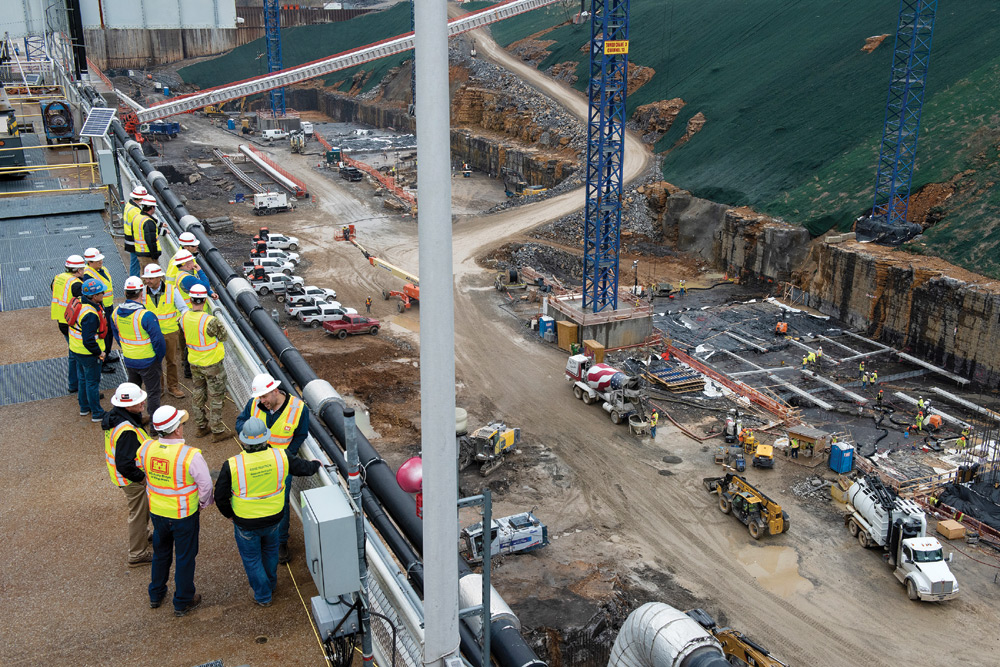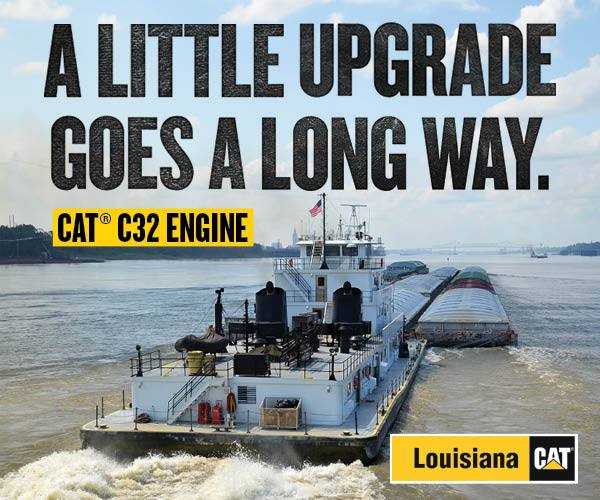Nashville Engineer District leaders, engineers and project managers hosted stakeholder roundtables recently to provide updates and an opportunity to visit the district’s two mega construction projects.
Lt. Col. Joseph Sahl, Nashville District commander, said the concept of the “roundtables” with industry and agency stakeholders is building relationships through communication, which involves hosting them at the navigation lock construction projects, and then highlighting ongoing challenges and future risks that the Corps faces.
“Part of the benefit of stakeholder engagements, when we talk about partnering, is communicating the real challenges, wherever they came from, and what we are doing about it, and where we need their feedback and assistance,” Sahl said.
Chickamauga Lock
Nashville District officials held the first stakeholder roundtable March 20 at the Chickamauga Lock Replacement Project on the Tennessee River in Chattanooga, Tenn.
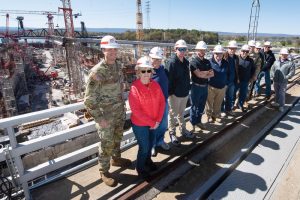
Sahl, Resident Engineer Tommy Long and Integrated Project Office Interim Chief Kevin Jasper welcomed Brandon Burris, Olin Chlor Alkali Logistics Inc.; Peter Serodino IV, Serodino Inc.; Doug Underwood, Erwin Marine Sales Inc.; Crystal Taylor, Ingram Barge Company; and Creed Owens, Erwin Marine Riverfront. He encouraged them to interact and ask questions.
Project Manager Omar Acevedo opened the roundtable with a presentation updating the construction project at Chickamauga Dam, a Tennessee Valley Authority project.
The Chickamauga Lock Replacement Project includes the design and construction of a 110- by 600-foot navigation lock downstream of the dam and riverward of the existing lock. Highway relocations, steel lock gates and valves fabrication, concrete approach wall beam fabrications, cofferdam construction and the majority of rock excavation are complete.
The new lock is required at Chickamauga Dam because of structural deficiencies resulting from physical expansion of the concrete structure. This phenomenon of concrete growth, first observed soon after initial construction in 1940, is caused by a reaction between the alkali in the cement and the aggregate. Even with significant maintenance efforts, this expansion threatens the structural integrity of the existing 360-by 60-foot lock and limits its serviceable life. The active lock can handle only one commercial barge at a time; the new lock will fit nine total barges at once.
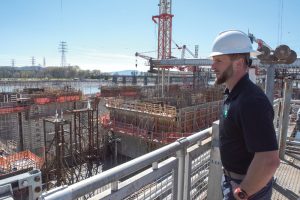
From February 2022 to February 2023, a total of 3,433 pleasure craft and 1,022,186 tons of commodities moved through Chickamauga Lock. No other lock in the Nashville District comes close to the number of recreational vessels that use this lock.
Shimmick Construction Company Inc. is currently building the new lock chamber, and C.J. Mahan Construction Company LLC is in the process of setting up operations to begin constructing the upstream approach walls.
Acevedo informed stakeholders during the project briefing that the Corps is in the process of updating the total cost estimate and schedule for the remaining work. This update will be provided to key stakeholders, including the Inland Waterways Users Board (IWUB) at the board’s next meeting in April.
Crystal Taylor with Ingram Barge Company is an IWUB board member who is assigned as the committee’s proponent of the Chickamauga Lock project. Visiting for the first time, she participated in the roundtable, toured the active lock and viewed the ongoing construction of the lock chamber.
“We’re always interested in how trust fund dollars are being spent,” Taylor said. “It was good to see it firsthand, instead of seeing the slides and the charts that we normally see. Understanding the history was helpful and why we are where we are today. It’s good to get a look at what the expectations are for finishing.”
Attending the roundtable also helped Doug Underwood, who works just upstream of the dam with Erwin Marine Sales Inc., a recreational boating supplier at Chickamauga Marina. He said he attended the groundbreaking of the construction project in 2005 and so he is personally and professionally interested in the status of the project.
Underwood explained that receiving an update directly from the Corps of Engineers and seeing the active lock and ongoing construction helps him because customers frequently ask about the status of the new lock construction.
“I’ve got a lot of confidence that this is coming along as best as it can,” Underwood said. “Given the constrictions we’ve had with labor and material shortages, I think you (the Corps) are doing the best you can, and that is all we can ask for.”
Kentucky Lock
At the Kentucky Lock Stakeholder Roundtable March 22 on the Tennessee River in Grand Rivers, Ky., Sahl, Jasper and Supervisory Navigation Facilities Manager Caleb Skinner welcomed Reggie Tubbs, Hines Furlong Line Inc.; David Edgin, Ingram Barge Company; Jason Adams, Inland Marine Service; Cmdr. Jennifer Andrew, commander of U.S. Coast Guard Marine Safety Unit Paducah; and Damon Judd, Marquette Transportation. He also promoted an open dialogue.
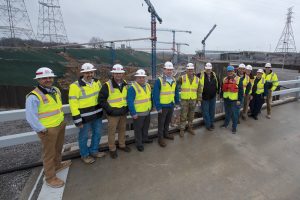
Project Manager Robert Winters opened the roundtable with a presentation updating the construction project at Kentucky Dam, a Tennessee Valley Authority project.
The Kentucky Lock Addition Project includes the design and construction of a 110- by 1,200-foot navigation lock landward of the existing 110- by 600-foot lock. Relocations of a transmission tower, highway, and railroad, and construction of the cofferdam and upstream monoliths and miter gates are completed. Site demolitions and relocation of utilities are also finished. Thalle Construction Company is currently building the downstream lock monoliths to complete the lock chamber.
Kentucky Lock handles approximately 57 million tons of commercial cargo and goods each year, valued at more than $10 billion. In 2022, 13,631 loaded barges, carrying 26,729,160 tons of commodities, and 11,594 empty barges passed through Kentucky Lock. The new 1,200-foot navigation lock is needed to reduce the logjam of commercial vessels and barges that experience an average nine-hour delay to move through the active 600-foot navigation lock.
Damon Judd with Marquette Transportation is vice chair of IWUB and is assigned as the committee’s proponent of the Kentucky Lock project. He participated in the roundtable, toured the active lock, and saw ongoing construction of the downstream monoliths.
He said he receives briefings and updates at IWUB meetings, but there is nothing more valuable than walking the site with the team to see what is going on and gaining an understanding of the complexities of what the Corps is trying to accomplish.
“This obviously positions me to help support the Corps team in terms of what the key themes are and make sure the industry understands that we’re aware and engaged in terms of how things are tracking, what the team is dealing with, and what the opportunities and risks are,” Judd said.
Jason Adams, Inland Marine Service chief operating officer, is involved with industry advocacy and education through the The American Waterways Operators and Waterways Council Inc., and he called the visit “an educational experience for me.”
Adams explained that the relationships and partnerships between the Corps of Engineers, Coast Guard and industry are invaluable because navigators, professional mariners and lock operators have to invest in teamwork.
“It’s always good to have a seat at the table because you know what they say: ‘It’s better to be at the table versus to be on the menu.’ So it’s good to talk about things like the mooring cells below the lock approaches,” Adams said. “A lot of things we’re facing like supply chains, materials, cost and labor, are the same risks the Corps is facing building this lock. There are lots of ways to get to the right solution, but it takes everybody being together and on the same team.”
Sahl said the roundtables were a resounding success, and the Nashville District plans to hold additional events in the future. He said the objective remains to improve communication with stakeholders with more frequency.
“We are working at the district level to ensure we are keeping them updated in between these routine engagements,” Sahl said. “We’ve learned in the last two or three years that things are changing faster than our formal scheduled meetings with key stakeholders. If we don’t find other ways to keep them informed, then it is going to be a surprise to them.”
Note: This article first appeared in a slightly longer form on the Nashville Engineer District’s website.


